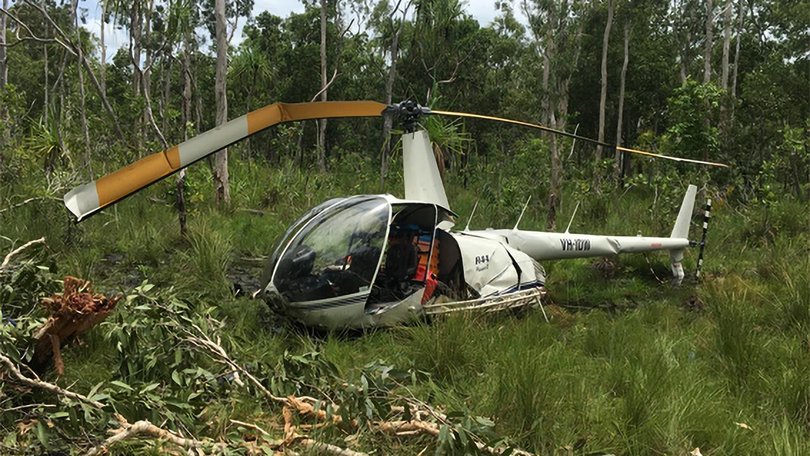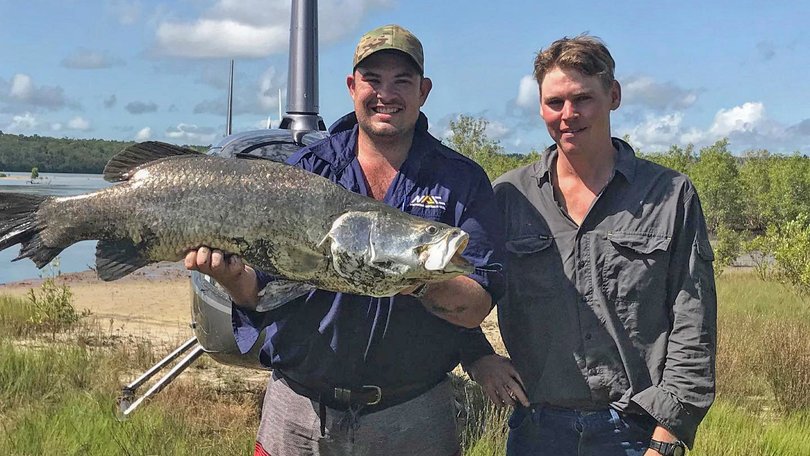Matt Wright: Chopper pilot denies ‘raging cocaine junkie’ claim in trial of ‘idolised’ Croc Wrangler boss
The pilot flying Outback Wrangler Matt Wright’s chopper when it fatally crashed has revealed why he made the split-second decision to release Netflix star Chris Wilson who was slinging beneath the aircraft.
The pilot who was flying Outback Wrangler Matt Wright’s chopper when it fatally crashed has revealed why he made the split-second decision to release Netflix star Chris Wilson, who was slinging beneath the aircraft, as the helicopter fell from the sky.
Sebastian Robinson – who worked for Mr Wright at the time of the crash – also says he had “idolised” his high-profile boss and broke aviation rules to please him.
On Tuesday, Mr Robinson began giving evidence via video-link at the celebrity croc-wrangler’s criminal trial in the Northern Territory Supreme Court.
Sign up to The Nightly's newsletters.
Get the first look at the digital newspaper, curated daily stories and breaking headlines delivered to your inbox.
By continuing you agree to our Terms and Privacy Policy.The 32-year-old suffered serious injuries, including “a complete sever of my spinal cord” when the helicopter he was flying crashed on February 28, 2022.
The accident, during a crocodile egg collecting mission at West Arnhem Land, also killed his friend Chris Wilson, who was slinging beneath the aircraft.
The aircraft – a Robinson R44, registered VH-IDW – was owned and operated by Mr Wright’s since-liquidated company Helibrook.
Mr Wright is on trial in Darwin after being charged with three counts of attempting to pervert the course of justice in relation to the investigation into the fatal crash.
The charges relate to allegedly lying to police, pressuring a witness (Mr Robinson) and destroying evidence.
The 45-year-old Top End tourism operator has pleaded not guilty to all charges.
On Tuesday the court heard that in addition to being a pilot, Mr Robinson has also worked as an egg collector – the person slung beneath the chopper in a harness attached to a 100 foot line – on “hundreds” of missions over a number of years.

He said crocodile egg collecting, conducted during the NT’s wet season, was dangerous and risky work which he knew could get him killed.
“Obviously because you’re going into a hostile environment where a crocodile is willing to protect her eggs. Obviously going underneath an aircraft, there’s terrain, weather,” he said.
As a pilot, he said the egg collector’s safety was paramount “because they’re the ones that are in the most danger”.
He said he would try to carry the egg collector on the sling as close to the ground as possible but it was “terrain dependent” and the sling person would often be lifted higher than 15 feet due to obstacles.
“You’d want to, you know, keep someone – without any terrain, if it’s open – as low as you can, maybe between 10 and 20 feet,” he said.
“Sometimes crocodiles nest in thick, tall vegetation with tall trees and in a swamp, so you have to sling the person to clear the trees to get into the location where the nest would be.
“The pilot is 100 feet above the person in the harness.”
The jury heard that an investigation into the crash found that Wilson fatally fell from a height of about 25m.
Mr Robinson accepts that, while he has no memory of it, he must have intentionally disconnected Wilson from the chopper as it crashed.
Crown prosecutor Jason Gullaci SC asked Mr Robinson what he was trained to do if “the helicopter got into some sort of trouble”.
“There’s a million different situations but … I know in my heart you’d try to get the person in the harness to the safest place that you could possibly get them before releasing them,” Mr Robinson said.
He said “in an ideal world” you would place the egg collector on the ground before releasing them from the cargo hooks but that it would depend on the type of emergency occurring and would not always be possible.
The Helibrook Operations Manual contained procedures for crocodile egg collecting.
Under “Emergency Procedures” it said that in the case of a partial engine failure “the pilot in command shall attempt to place the sling person on the nearest safe area and release the strops from the aircraft and the aircraft shall proceed to land at the nearest suitable area”.
In the case of a complete engine failure “the pilot in command shall release the sling person as close to the ground as practicable and attempt the cushioning onto the ground forward of the sling person and clear”, the company’s operating manual said.
Mr Robinson said keeping an egg collector attached to the aircraft in the case of a complete engine failure “would be catastrophic”.
“More than likely they’re going to hit the ground even harder and the sling could wrap around whatever vegetation there is and then dynamically roll the helicopter over into the ground or on top of the person being slung,” he said.
“You’re going to land straight on top - you’re going straight down on top of them.”
Mr Gullaci asked Mr Robinson what would have happened if he had not released Wilson from the aircraft on the day of the crash.
“He would have got – he would have got ragdolled through the vegetation,” he said.
“It would have been severely worse than what happened.”
The court heard that Mr Robinson left school after Year 10 and started his Aircraft Maintenance Engineering Licence apprenticeship with North Australian Helicopters, owned by cattle baron and reality television star Milton Jones, when he was 15 or 16 years old.
After about five years, he became a qualified Licensed Aircraft Maintenance Engineer before getting his pilot’s license.
At the time of the accident Mr Robinson was an experienced pilot and qualified to fly various helicopters, including the R22, R44, R66, B206 Jet Ranger and B206 Long Ranger.
He said he had never run of fuel or been involved in a helicopter crash prior to this fatal accident in VH-IDW.
For about two and half years prior to the February 2022 crash, Mr Robinson had held the position of Head of Airworthiness and Aircraft Maintenance Control (HAAMC) at Mr Wright’s company Helibrook.
The HAAMC is responsible for air worthiness and maintenance of an aircraft and for scheduling maintenance.
Mr Robinson said that was what the HAAMC position “was meant to be … if the rules were followed”.
“Matt controlled all aspects of his aircraft regarding maintenance scheduling,” he said.
“I was never paid to fill the role; it was just a name put forward to CASA (the Civil Aviation Safety Authority) so Helibrook could operate.
“I never received any remuneration for the HAAMC position.”
In the six months leading up to the fatal crash, most of Mr Robinson’s work for Mr Wright was flying his choppers on crocodile egg collecting missions.
“I’d only generally fly the aircraft that was involved in the accident, IDW,” he said.
Mr Gullaci asked the witness if, during the time he worked for Mr Wright, there had been occasions when the Hobbs meter in Helibrook’s helicopters were disconnected, to which he replied “yes”.
“Similarly, was there a practice at Helibrook, when you flew Mr Wright’s helicopters, of not recording all your flight hours in maintenance releases for the relevant helicopter?” the prosecutor asked. Mr Robinson replied “yes”.

The pilot said it was “very common” for the Hobbs meter to be disconnected and not to record all flight hours in the aircraft’s MR.
He said Mr Wright would direct him to ‘pop the clock for this trip’, as in disconnect the Hobbs meter, and his boss benefited from it.
“Because he owned the aircraft and obviously, you’re doing more hours and you’re not recording them, you get, you know, you make the extra money and it prolongs maintenance intervals between having to spend money,” he said.
Mr Robinson said he had become aware of, learnt to and performed disconnecting the Hobbs meter and not recording flight hours while working for other aviation businesses before commencing working for Mr Wright, and that the practise was widespread.
He also “sometimes” disconnected the Hobbs metre and under-recorded flight hours in his own aircraft but “only while working under Helibrook”.
Mr Robinson said pilots who worked for Mr Wright would always follow his orders in relation to disconnecting the hour meter and not recording of flight hours.
“Absolutely. Everyone looked at Matt has an idol and, you know, if he said, ‘jump’, they’d say, ‘how high?’,” he said.
“He’s a major public figure. Everyone wanted to be around him, work for him and, you know, everyone bent over backwards to try and be a part of what he was doing.”
Mr Robinson agreed with Mr Gullaci that Mr Wright had “an aura about him” but when asked what sort of “presence” he had, replied: “I guess it depends on what mood he was in”.
“I wouldn’t say (I was) intimidated but, you know, we were young men,” he said.
“You know, we looked up to him and you know, we just wanted to do our best to make ourselves look good in front of him and do whatever he said.”
Mr Robinson said defects in Mr Wright’s helicopters “were never recorded as far as I know”.
When asked who at Helibrook made the decision not to record defects in the aircraft’s MR, Mr Robinson said “it was just knowing that you don’t”.
“You just ring the engineer,” he said.
In the lead-up to the crash, Mr Robinson said he was planning to leave Helibrook so had applied to CASA for his own Air Operator’s Certificate.
“I was trying to get away,” he said.
“I obtained my AOC approximately two weeks before the accident.”
The court has previously heard that Mr Wright visited Mr Robinson twice, in the days after the crash, while he was in a Brisbane hospital, in an alleged attempt to have the injured pilot falsify flight records.
The court heard that prior to Mr Wright’s hospital visits on March 11 and March 13 in 2022, doctors had delivered Mr Robinson a dire prognosis.
“I was in pretty bad shape and I, you know, they told me that I had a severe spinal injury and that I may never walk again,” he said.
“But, you know, I did my best to try and not believe it and, you know, obviously dealing with a brain injury and everything, I just - it was a very hard time - time for me, yep.”
Mr Gullaci asked Mr Robinson to explain the injuries he had sustained to the jury.
“Yeah, I can, but it obviously makes me a little bit upset, he said.
“Fractured L1, T12, T11, T10 vertebrae resulting in a complete sever of my spinal cord, rendering me a paraplegic.
“I fractured 12 ribs, puncturing both lungs and causing severe internal bleeding. I fractured C6 and C7 vertebrae in my neck.
“I fractured my left elbow, both my ankles and I suffered a traumatic brain injury from, a TBI, from impact.”
He has noticed a marked difference in his cognitive abilities as well as his memory.
“I can’t, you know, when I get put under pressure, what I think I can’t (actually) say, like I can’t put it into words what I’m trying to, what I’m thinking in my brain to what I’m trying to say,” he said.
“I get frustrated very easily.
“I have sleep issues and yeah, mood swings.
“Definitely I’m a different person compared to what I was pre-accident.”
Mr Robinson, who has undergone about 20 surgeries since the crash, said he only has fragments of memory from the day of the crash.
“I don’t have a continual memory, I’ve just got glimpses of the morning and … like a picture in my head of what I thought at Mount Borradaile,” he said.
“I remember like sort of driving to (Helibrook’s Noonamah) hangar, like it’s all really a bit fuzzy and then getting … getting some things ready.
“I remember sitting in the helicopter with Willow and then some sort of social media posts arose that he was looking at on Facebook and then we were having a bit of a laugh about it and then ... my memory sort of cuts off from there.”
He said his memory of what happened at the Mount Borradaile fuel drum site – enroute to the King River staging area – is “very fuzzy”.
“I’m pretty sure we were the first helicopter to arrive,” he said.
“The airstrip has tall trees either side and I just have a glimpse of a memory of going along the airstrip, taking off and just blurry seeing trees out the side.”
When asked if he recalls VH-IDW being refuelled at Mount Borradaile, Mr Robinson said he recalls seeing a fuel drum and a fuel pump.
“I don’t have an actual recollection of the helicopter getting fuelled, but one of my vivid memories was seeing a fuel pump (being) walked over from another, like coming over towards us from another helicopter,” he said.
“That’s a mechanical hand pump that folds up under the seat that you use to refill a helicopter from a 44-gallon drum.”
Mr Robinson said he does not recall the low fuel warning light – which indicates 18L of fuel remaining – ever illuminating while he has been flying.
He said if the low-fuel light illuminated, “you’d land immediately”.
“Because you don’t want to run out of fuel while you’re in the air,” he said.
Mr Robinson said he had flown from Helibrook’s Noonamah hangar to King River about 40 times and was very familiar with the area.
The court heard Wilson had snapped a photo at 7.43am on the morning of the crash, while flying VH-IDW between Noonamah and Mount Borradaile, which captured the chopper’s fuel gauge in the background.
The fuel gauge photo showed that the two interconnected fuel tanks were at least three-quarters full at that time.
Mr Robinson said the chopper, based on photo evidence, had enough fuel in the tanks to fly to King River and some of the way back to Darwin.
After the crash, when Mr Robinson woke up in a Brisbane hospital and was told Wilson was dead, he knew there would be an investigation and feared he would be blamed.
“I was in a pretty bad shape, but yes, I guess the thought definitely passed through my mind,” he said.
In the months that followed, he was interviewed by investigators from the NT Police, the Australian Transport and Safety Bureau and CASA.
He admits lying to investigators, in his first few interviews, about under recording flight hours and disconnecting the Hobbs meter.
“Yes, obviously I was panicking and you know,” he said.
“I guess it was pure panic and yes, I was scared … of potential repercussions.
“I don’t know, I guess potentially being blamed and - and, you know, my pilot’s licence being affected.”
The court heard that in later interviews, Mr Robinson confessed to breaking the rules in relation to the helicopter’s Hobbs meter and the maintenance releases.
On Monday, Mr Wright’s defence barrister David Edwardson suggested to witness Jock Purcell that Mr Robinson was a “party animal” and regular cocaine user prior to the crash.
On Tuesday Mr Robinson admitted to occasional drug use but denied ever flying while under the influence of drugs or alcohol.
He said he had used cocaine “maybe a couple of times a year” in the five years prior to the accident.
“Can you remember if you used cocaine ... in the day or days before the crash?” Mr Gullaci asked.
“I have no recollection of the weeks prior,” Mr Robinson replied.
“Were you a raging cocaine junkie, Mr Robinson?” the prosecutor pushed.
“Not at all,” he replied.
Mr Robinson is continuing to give evidence before Acting Justice Alan Blow on Wednesday.

